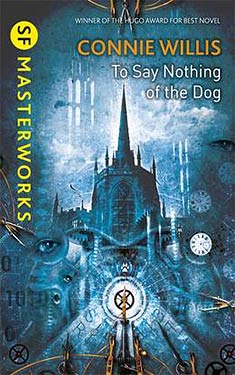Connie Willis
Completed 1/29/2015, Reviewed 1/31/2015
4 stars
Connie Willis’ second of the Oxford Time Travel Series once
again has hapless time traveling historians trapped in difficult predicaments
by the malfunctioning net and surrounded by single-minded characters who barely
let the protagonist get a word in edgewise.
This time, this comedy of manners format is truly a comedy, crossing the
style of Oscar Wilde with the formulaic mysteries of Agatha Christie set in the
middle of some fairly complex time travel dilemmas. This was my second reading of the book, and I
enjoyed it far more than my first time, when I was distracted by a painful
back, impending lay-offs, and the deep longing to be back in the epic fantasy
world of the novel I had just finished.
This time, I thoroughly reveled in the chaos of time travel mishaps and
time travelers who just can’t seem to get a break.
“Dog” centers around Ned Henry, an Oxford historian who is
one of the many poor souls being ordered around the past by Lady Shrapnell, an
extremely wealthy woman funding the struggling history department. The condition of her endowment is that the
department throws all their resources into her projects, this one being the
recreation of the Coventry Church destroyed in WWII. With her mantra “God is in the details”, she
sends the historians back in time to identify all aspects of the church so that
she can create a perfect replica.
Unfortunately, Henry has jumped into the past so many times trying to
find the bishop’s bird stump, he is suffering from serious time lag. To give him a break and hide him from Lady
Shrapnell, the department’s director sends him to the late 1800s to get two weeks
rest. Of course, a series of mishaps throws him into
the center of a frustrating mystery of cats, missed meetings, spiritualists,
absent-minded professors, and the very first jumble sale, to say nothing of the
dog.
I think the first time I read this book, I was annoyed by
the stuffy single-minded upper class who were the bane of Ned’s existence. This time, I was able to revel more in the satire
and appreciate the construction of the characters. I was also much more caught up in the
mystery. And even though I had read the
book before, I was surprised by the simple ending. But what makes this story so fun is the
roller coaster ride through the stuffy, pushy upper class bozos of the
Victorian Age that completely distract you from that end. Ned is a wonderfully likeable sad sack who
just can’t get a break. But somehow, he
suffers through the self-important, over-entitled buffoons and the misfirings
of the time travel net to piece together the miasma of clues to solve the
mystery of the bird stump and save the future.
What really amazed me this time was the complexity Willis’
time travel chaos. I think it helped
that I’ve read all the Oxford novels now and this was my second reading of this
one. Like Lady Shrapnell’s motto, the details are what make this book
amazing. It’s the butterfly effect taken
to the extreme: one seemingly minor
action having major repercussions for the future. And it speaks to Willis’ genius how she can
flesh out the chaos into plot, theme, and characterization, and conflict.
“To Say Nothing of the Dog” is a great book in a great
series. Being a comedy, it doesn’t have
the emotional impact of her earlier “Doomsday Book”, but it is masterful
fun. It is one of the few comedies to
win the Hugo Award. I highly recommend
this novel. If you decide to read it, I
recommend starting with “Doomsday” though.
While each novel is self-contained, the chaos of the malfunctioning time
travel net gets more complex, and having the exposure to it in the publishing order
helps with the understanding of it. And
reading them in order of drama, comedy, long drama, makes for a better
appreciation of the progression of the chaos.
Four out of five stars.

This is one I have and want to read. I've read so little of Willis' work, and love so much of what I've read, that it is ridiculous that I haven't gotten to more of her longer fiction.
ReplyDeleteI really love her. I don't know if I'll get to other works by her this, but I think I only have her short fiction and shorter novels left, so I may sneak one or two in.
Delete